延续性动词与非延续性动词 总结(含练习)
英语延续性动词与非延续性动词

1. reacharrive in / at → be in / atcome to2. come out →be outgo3. come —be here4. leave —be away / from5. join —be a member of / be in the6. die —be dead7. catch a cold —have a cold8. begin / start =be on9. put on —wear10. buy —have11. borrow —keep12. become —be13. fall asleep —be asleep14. fall ill be ill\ sicksick15. open —be open16. lose —be lost17. get to know—begin to know18. go to sleep/get to sleep=sleep19. get up —be up20. close —be closed21. finish / end —be over22. move —be out of23. break —be broken24. marry —be married25. go —be away26. wake —be awake27. get to know --- know,28.wear→put on英语动词根据词义可分为两种,一种是延续性的,一种是终止性的,终止性动词(也可称为非延续性动词,瞬间动词,或点动词),如begin,start,die,buy,leave, come等,表示动作的发生与结束于一瞬间完成,不能再延续,所以它的现在完成时不能和表示延续的时间状语连用,即不能与表示一段时间的状语,for+时间段, since+时间点/从句连用,也不能用在how long引导的特殊疑问句中.eg. I've left Shanghai for three days.(×) I've been away from Shanghai for three days.( √ ).I left Shanghai three days ago. ( √ ) It is /has been three days since I left Shanghai.( √ )常见终止性动词有:leave, go, come, arrive, begin, buy, borrow, die, join, become等.终止性动词要表示持续时, 可用以下方法:⑴.将时间状语改为时间段+ ago,句中谓语动词用一般过去时.eg.我弟弟参军两年了. My brother joined the army two years ago.⑵.若保留for+时间段,since+时间点/从句, 或用在how long 句型中,则需将终止性动词改为相应的状态动词或延续性动词常见终止性动词与延续性动词(或状态动词)的对应关系如下come/go/arrive/get/reach/move------be in/at open-----be opendie------be dead close----be closed become---be borrow---keep begin/start-----be on put on----wearleave-----be away (from) buy-----have fall asleep----be asleepend/finish-----be over catch a cold-----have a coldjoin the army----be in the army be a soldier join the Party----be in the Party be a Party member→My brother has been in the army for two years. →My brother has been a soldier for two years动词按其动作发生的方式,动作发生过程的长短,分为延续性动词和终止性动词。
延续性动词与非延续性动词总结

延续性动词与非延续性动词总结1. to be(是,存在):I am studying.(我正在学习。
)2. to live(居住):She lives in New York.(她住在纽约。
)3. to work(工作):He is working late tonight.(他今晚要工作到很晚。
)4. to study(学习):They have been studying for hours.(他们已经学习了几个小时了。
)5. to run(跑):He has been running for 30 minutes.(他已经跑了30分钟了。
)非延续性动词:1. to eat(吃):They ate dinner together.(他们一起吃饭了。
)2. to jump(跳跃):The kids jumped on the trampoline.(孩子们在蹦床上跳跃。
)3. to smile(微笑):She smiled at her friend.(她对朋友微笑。
)4. to laugh(笑):They laughed at the funny joke.(他们笑了个不停,笑了个肚子疼。
)5. to sneeze(打喷嚏):He sneezed because of the dust.(他因为灰尘打了个喷嚏。
)需要注意的是,并不是所有动词都严格属于延续性动词或非延续性动词,有些动词的延续性取决于上下文和语境。
因此,在使用动词的时候需要根据具体情况来确定是否使用延续性动词还是非延续性动词。
练习延续性和非延续性动词的用法
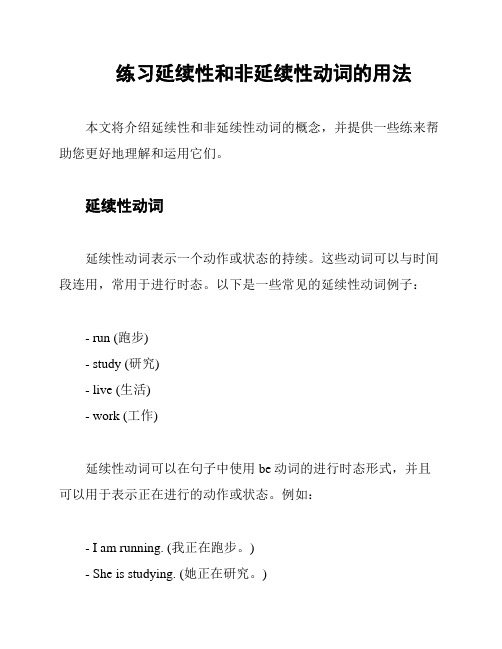
练习延续性和非延续性动词的用法本文将介绍延续性和非延续性动词的概念,并提供一些练来帮助您更好地理解和运用它们。
延续性动词延续性动词表示一个动作或状态的持续。
这些动词可以与时间段连用,常用于进行时态。
以下是一些常见的延续性动词例子:- run (跑步)- study (研究)- live (生活)- work (工作)延续性动词可以在句子中使用be动词的进行时态形式,并且可以用于表示正在进行的动作或状态。
例如:- I am running. (我正在跑步。
)- She is studying. (她正在研究。
)- They are living in London. (他们住在伦敦。
)- We are working on a project. (我们正在进行一个项目。
)非延续性动词非延续性动词表示一个动作或状态的短暂性或瞬时性。
这些动词不可以与时间段连用,常用于一般时态。
以下是一些常见的非延续性动词例子:- eat (吃)- drink (喝)- sleep (睡觉)- arrive (到达)非延续性动词不能用于进行时态,因为它们表示的动作或状态是瞬时的。
例如:- I ate breakfast this morning. (我今早吃了早餐。
)- She drank a glass of water. (她喝了一杯水。
)- He slept for eight hours. (他睡了八个小时。
)- They arrived at the airport on time. (他们准时到达了机场。
)练请根据下列句子中的动词判断它们是延续性动词还是非延续性动词,并将正确的选项填入括号中:1. We (are/is) playing basketball in the park.2. He (ate/eats) dinner at a restaurant yesterday.3. They (are/is) swimming in the pool.4. She (sleeps/slept) for twelve hours last night.5. I (am/ate) an apple for a snack.答案:1. are2. ate3. are4. slept5. ate总结延续性动词表示一个动作或状态的持续,可以用于进行时态;非延续性动词表示一个动作或状态的短暂性或瞬时性,不能用于进行时态。
延续性动词与非延续性动词

延续性动词与非延续性动词(Mrs. Zhou)1.We have known each other for two years.=We got to know each other two years ago.2. He has been away(adv.) from his hometown for two years=He left his hometown two years ago .3. They have been married for two years=They got married two years ago.4.I have kept the book for two weeks=I borrowed the book two weeks ago.5. I have had the bike for two weeks= I bought the bike two weeks ago6. The old man has been dead for two years .= The old man died two years ago7. The movie has been on for ten minutes= The movie began/ started ten minutes ago.8. My brother has been in the Party for two years.= My brother has been a member of the Party for two years .=My brother joined the Party two years ago .9. I have had the letter from Mary for two weeks= I got the letter from Marry / received the letter from Mary / heard from Mary / two weeks ago.10. Tom has had a cold for two days =Tom got a cold two days ago.。
现在完成时常见的延续性动词及练习
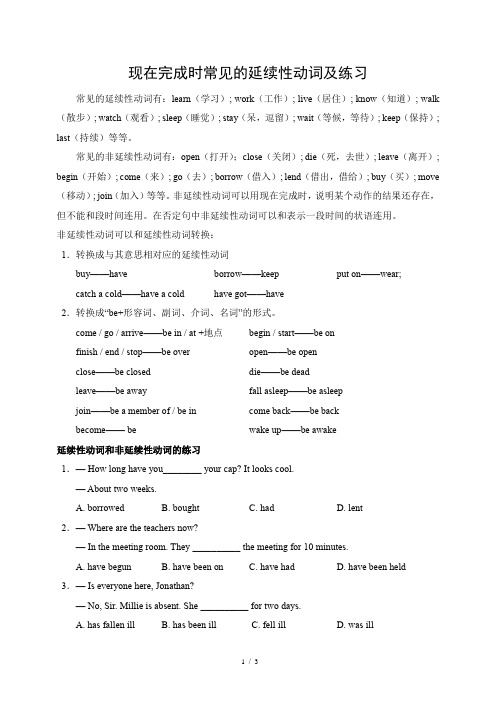
现在完成时常见的延续性动词及练习常见的延续性动词有:learn(学习); work(工作); live(居住); know(知道); walk (散步); watch(观看); sleep(睡觉); stay(呆,逗留); wait(等候,等待); keep(保持); last(持续)等等。
常见的非延续性动词有:open(打开);close(关闭); die(死,去世); leave(离开); begin(开始); come(来); go(去); borrow(借入); lend(借出,借给); buy(买); move (移动); join(加入)等等。
非延续性动词可以用现在完成时,说明某个动作的结果还存在,但不能和段时间连用。
在否定句中非延续性动词可以和表示一段时间的状语连用。
非延续性动词可以和延续性动词转换:1.转换成与其意思相对应的延续性动词buy——have borrow——keep put on——wear;catch a cold——have a cold have got——have2.转换成“be+形容词、副词、介词、名词”的形式。
come / go / arrive——be in / at +地点begin / start——be onfinish / end / stop——be over open——be openclose——be closed die——be deadleave——be away fall asleep——be asleepjoin——be a member of / be in come back——be backbecome—— be wake up——be awake延续性动词和非延续性动词的练习1.— How long have you________ your cap? It looks cool.— About two weeks.A. borrowedB. boughtC. hadD. lent2.— Where are the teachers now?— In the meeting room. They __________ the meeting for 10 minutes.A. have begunB. have been onC. have hadD. have been held 3.— Is everyone here, Jonathan?— No, Sir. Millie is absent. She __________ for two days.A. has fallen illB. has been illC. fell illD. was ill4.— The new skirt looks good on you. When did you buy it?— On July 7th. I _________ it for a week.A. have boughtB. have hadC. boughtD. buy5.— It's 20 years since we came back to Liangshan.— How time flies! We _________ in our hometown for such a long time.A. workB. workedC. has workedD. have worked 6.Bob, you ________ in this city since 2018. How do you like it?A. livedB. liveC. have livedD. lives7.My father has _________ for five years.A. diedB. been deadC. deadD. been died8.We ________ from our hometown for about ten years.A. have been awayB. have leftC. have awayD. was away9.The film ________ for about ten minutes.A. has begunB. has startedC. beganD. has been on10.The shop __________ since last month.A. has openedB. has been openC. openedD. was openhave been(to)与have gone(to)的区别及用法:have been(to)表示某人去过某地,已经回来了。
延续性动词和非延续性动词的练习题

延续性动词和非延续性动词的练习题练题一:选择正确的动词填空1. My sister ___________ a book in her room. (read / reads)2. We ___________ dinner together every evening. (eat / eats)3. They ___________ to music in the living room. (listen / listens)4. Tom ___________ basketball in the park. (play / plays)5. She ___________ a beautiful song at the concert. (sing / sings)6. The children ___________ to school by bus. (go / goes)7. My parents ___________ their anniversary last week. (celebrate / celebrates)8. He ___________ TV in the living room. (watch / watches)练题二:改写下列句子,使用正确的延续性动词或非延续性动词1. I'm smelling the flowers in the garden.- I ___________ the flowers in the garden. (smell)2. She's hearing a strange noise in the attic.- She ___________ a strange noise in the attic. (hear)3. We're seeing a movie tonight.- We ___________ a movie tonight. (see)4. They're tasting the new recipe.- They ___________ the new recipe. (taste)5. He's touching the soft fabric.- He ___________ the soft fabric. (touch)练题三:判断下列句子中的动词是延续性动词还是非延续性动词1. She is running in the park.- 是延续性动词 (延续性动词)2. They are talking about their vacation plans.- 是延续性动词 (延续性动词)3. The baby is crying loudly.- 是延续性动词 (延续性动词)4. He is thinking about his future career.- 是延续性动词 (延续性动词)5. The students are studying for their exams.- 是延续性动词 (延续性动词)请根据以上练习题进行练习,巩固对延续性动词和非延续性动词的理解。
现在完成时中延续性动词和非延续性动词
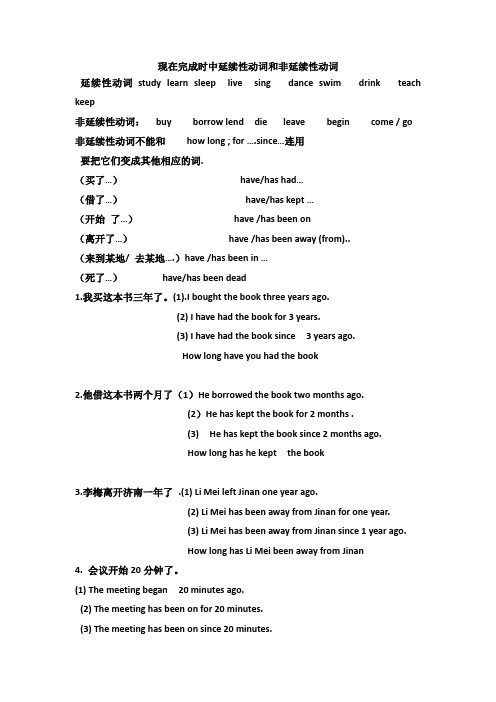
现在完成时中延续性动词和非延续性动词延续性动词study learn sleep live sing dance swim drink teach keep非延续性动词:buy borrow lend die leave begin come / go 非延续性动词不能和how long ; for ….since…连用要把它们变成其他相应的词.(买了…)have/has had…(借了…)have/has kept …(开始了…)have /has been on(离开了…)have /has been away (from)..(来到某地/ 去某地….)have /has been in …(死了…)have/has been dead1.我买这本书三年了。
(1).I bought the book three years ago.(2) I have had the book for 3 years.(3) I have had the book since 3 years ago.How long have you had the book2.他借这本书两个月了(1)He borrowed the book two months ago.(2)He has kept the book for 2 months .(3) He has kept the book since 2 months ago.How long has he kept the book3.李梅离开济南一年了.(1) Li Mei left Jinan one year ago.(2) Li Mei has been away from Jinan for one year.(3) Li Mei has been away from Jinan since 1 year ago.How long has Li Mei been away from Jinan4. 会议开始20分钟了。
完整版)延续性动词和非延续动词转换和练习(精华)

完整版)延续性动词和非延续动词转换和练习(精华)本文讲述了终止性动词与延续性动词之间的转换。
终止性动词指的是动作的发生与结束于一瞬间完成,无法再延续。
因此,现在完成时不能与表示延续的时间状语连用,也不能用在how long引导的特殊疑问句中。
如果需要表示持续,可以将时间状语改为时间段+ ago,谓语动词用一般过去时;或者将终止性动词改为相应的状态动词或延续性动词。
在实际应用中,常见的短暂性动词与延续性动词的转换包括be型和实义动词型。
例如,go there可以转换为be there,come here可以转换为be here,finish/end可以转换为be over,get married可以转换为be married等等。
这些转换可以帮助我们更准确地表达动作的状态和持续时间。
1.Borrowing means temporarily taking something from someone else。
while keeping something means having n of it permanently。
Similarly。
buying something means acquiring it for good。
while having something means already possessing it。
2.Instead of saying "begin to teach," we can simply say "teach."3.Getting to know someone means ing acquainted with them。
while knowing someone means already having a nship with them。
4.Putting on clothes means dressing oneself。
延续性动词和非延续性动词

延续性动词和⾮延续性动词⼀.延续性动词和⾮延续性动词:㈠延续性动词:表⽰⼀种可以持续的⾏为过程或状态。
drink喝have有talk说know 知道stand站⽴sleep睡觉sing唱歌wait等wear穿walk⾛work⼯作rain下⾬keep保持snow 下雪eat 吃read读play玩live 居住smoke 抽烟lie躺着stay保持㈡终⽌性动词:(⾮延续性动词),表⽰⾏为或者动作是短暂瞬间完成的。
come来fall倒borrow借admit承认break打破start开始join加⼊buy买jump跳lose丢open打开close关stop结束begin开始go⾛put 放die死hit击中leave离开arrive到达marry结婚㈢两者的⽤法和区别:1.延续性动词可以⽤表⽰⼀段时间的状语修饰,⾮延续动词不可⽤。
How long can I keep the book.这本书我可以借多久?They will work here till next Friday.她们要在这⾥⼯作到下周五。
2.有时,⾮延续性动词也可以与表⽰⼀段时间的时间状语搭配,但这种表⽰⼀段时间的状语,实质上是表⽰⼀段时间内的某个时间“点”。
The play will start in half an hour.这出戏半个⼩时后开始。
The fire broke out during the night.⽕是夜间发⽣的。
3.⾮延续性动词⼀般不⽤于while引导的时间状语从句中。
While I came home, he was cooking dinner. (错)When I came home, he was cooking dinner. (对)4.⽤延续性动词表⽰⼀时的动作,可以在该动词前加get/begin/come.When did you get to know him?你什么时候认识他的?They begin to see that they had made a serious mistake.她们开始认识到⾃⼰犯了⼀个⼤错。
现在完成时中延续性动词和非延续性动词
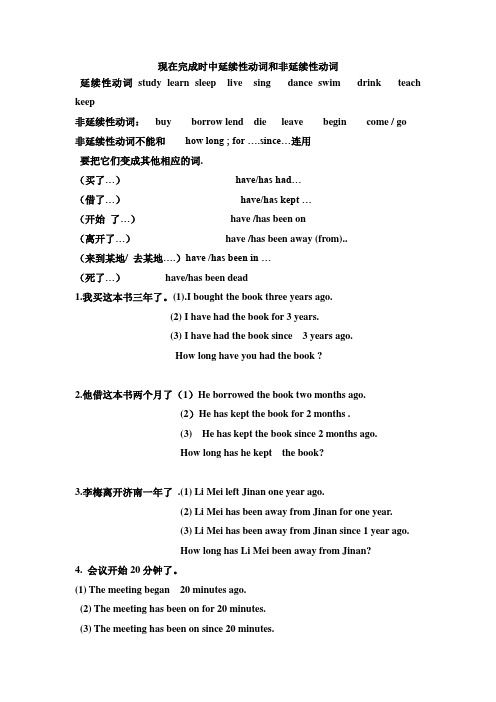
现在完成时中延续性动词和非延续性动词延续性动词study learn sleep live sing dance swim drink teach keep非延续性动词:buy borrow lend die leave begin come / go非延续性动词不能和how long ; for ….since…连用要把它们变成其他相应的词.(买了…)have/has had…(借了…)have/has kept …(开始了…)have /has been on(离开了…)have /has been away (from)..(来到某地/ 去某地….)have /has been in …(死了…)have/has been dead1.我买这本书三年了。
(1).I bought the book three years ago.(2) I have had the book for 3 years.(3) I have had the book since 3 years ago.How long have you had the book ?2.他借这本书两个月了(1)He borrowed the book two months ago.(2)He has kept the book for 2 months .(3) He has kept the book since 2 months ago.How long has he kept the book?3.李梅离开济南一年了.(1) Li Mei left Jinan one year ago.(2) Li Mei has been away from Jinan for one year.(3) Li Mei has been away from Jinan since 1 year ago.How long has Li Mei been away from Jinan?4. 会议开始20分钟了。
英语延续性与非延续性动词总结与练习
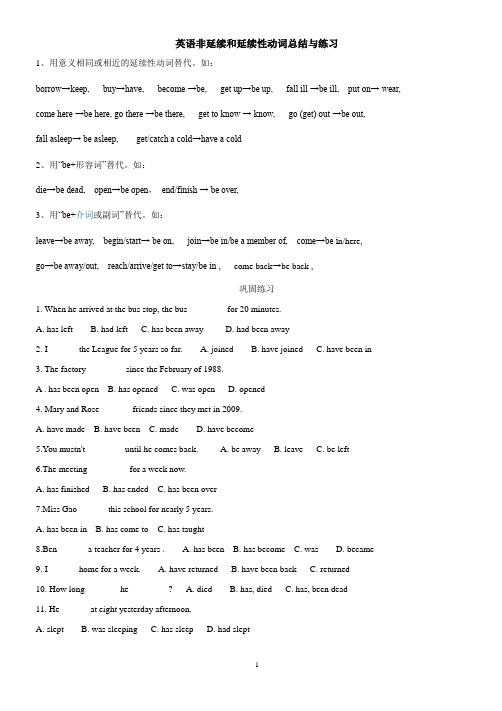
1、用意义相同或相近的延续性动词替代。
如:borrow→keep, buy→have, become →be, get up→be up, fall ill →be ill, put on→ wear, come here →be here, go there →be there,get to know → know, go (get) out →be out,fall asleep→ be asleep, get/catch a cold→have a cold2、用“be+形容词”替代。
如:die→be dead, open→be open,end/finish → be over,3、用“be+介词或副词”替代。
如:leave→be away,begin/start→ be on, join→be in/be a member of, come→be i n/here,go→be away/out, reach/arrive/get to→stay/be in , come back→be back ,巩固练习1. When he arrived at the bus stop, the bus ________ for 20 minutes.A. has leftB. had leftC. has been awayD. had been away2. I ______ the League for 5 years so far. A. joined B. have joined C. have been in3. The factory ________ since the February of 1988.A . has been open B. has opened C. was open D. opened4. Mary and Rose _______friends since they met in 2009.A. have madeB. have beenC. madeD. have become5.You mustn't ________ until he comes back. A. be away B. leave C. be left6.The meeting _______ for a week now.A. has finishedB. has endedC. has been over7.Miss Gao ______ this school for nearly 5 years.A. has been inB. has come toC. has taught8.Ben ______ a teacher for 4 years . A. has been B. has become C. was D. became9. I ______ home for a week. A. have returned B. have been back C. returned10. How long _______ he ________ ? A. died B. has, died C. has, been dead11. He ______ at eight yesterday afternoon.A. sleptB. was sleepingC. has sleepD. had slept12.He ________ the car for a week.A. boughtB. has boughtC. has had13.-----How long _____ you _____ ill ? -----Two weeks.A. did fallB. have, fellC. have, been14.Since 2009, he _____ his hometown.A. has leftB. has moved awayC. has been away from15.I'll lend you the book , but you can only _____ it for 2 days.A. borrowB. keepC. take16.The bus ______ on the road for 2 hours so far.A. has stoppedB. stoppedC. has been17.Are you _____ the jacket these days?A. wearingB. putting onC. dressingD. on18.He ________ for 2 hours. A. got up B. has got up C. has been up19. Tom is ill in hospital. He _______ a cold for several days.A. isB. catchesC. has caughtD. has had20.----- How long can I ______ the book? ------ Two weeks.A. borrowB. lendC. getD. Keep21.---How long have you ________ the book? ---Two weeks.A. boughtB. lentC. hadD. Borrowed22. ---Do you know him well?---Sure, we________friends for ten years.A. wereB. have beenC. have becomeD. have made。
现在完成时之延续性动词与非延续动词

延续性动词VS非延续动词
延续性动词:动词可以延续下去or产生持久影响
learn,work,stand,know,walk,keep,have,wait,watch,sing,read,sleep,live,stay
He has slept for more than 10 hours.
He has slept since last night/10 hours ago.
die
be dead
return
be back
begin/start
be on
open
be open
表2:
ห้องสมุดไป่ตู้非延续动词
延续性动词
borrow
keep
buy
have
catch a cold
have a cold
get to know
know
put on
wear
例:He hasleftbeen awayfor 3 days.
He has left.(√)
He has left for three days.(×)
How非延续动词延续性动词
表1:
非延续动词
延续性动词(be+...)
go to sp.
be in sp.
go to school
be a student
join
be a member of
leave
be away
3.改写句子
He went to Beijing two weeks ago.
He _____ ______ ______ Beijing for 2 weeks.
答案:1.C 2.D 3.has been in
英语延续性动词与非延续性动词
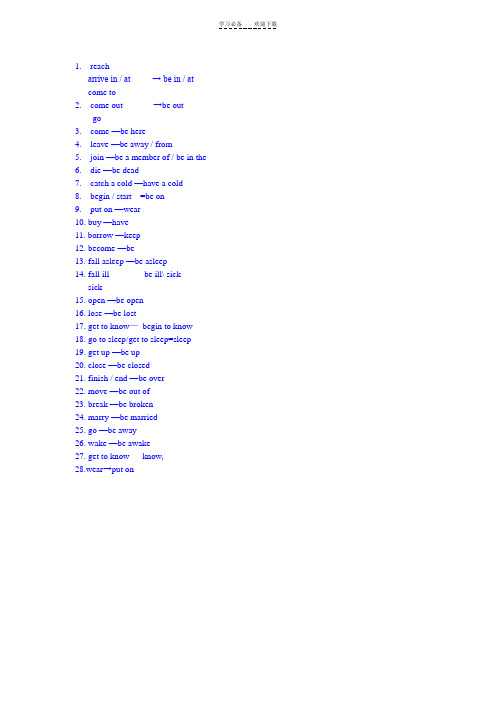
1. reacharrive in / at → be in / atcome to2. come out →be outgo3. come —be here4. leave —be away / from5. join —be a member of / be in the6. die —be dead7. catch a cold —have a cold8. begin / start =be on9. put on —wear10. buy —have11. borrow —keep12. become —be13. fall asleep —be asleep14. fall ill be ill\ sicksick15. open —be open16. lose —be lost17. get to know—begin to know18. go to sleep/get to sleep=sleep19. get up —be up20. close —be closed21. finish / end —be over22. move —be out of23. break —be broken24. marry —be married25. go —be away26. wake —be awake27. get to know --- know,28.wear→put on英语动词根据词义可分为两种,一种是延续性的,一种是终止性的,终止性动词(也可称为非延续性动词,瞬间动词,或点动词),如begin,start,die,buy,leave, come等,表示动作的发生与结束于一瞬间完成,不能再延续,所以它的现在完成时不能和表示延续的时间状语连用,即不能与表示一段时间的状语,for+时间段, since+时间点/从句连用,也不能用在how long引导的特殊疑问句中.eg. I've left Shanghai for three days.(×) I've been away from Shanghai for three days.( √ ).I left Shanghai three days ago. ( √ ) It is /has been three days since I left Shanghai.( √ )常见终止性动词有:leave, go, come, arrive, begin, buy, borrow, die, join, become等.终止性动词要表示持续时, 可用以下方法:⑴.将时间状语改为时间段+ ago,句中谓语动词用一般过去时.eg.我弟弟参军两年了. My brother joined the army two years ago.⑵.若保留for+时间段,since+时间点/从句, 或用在how long 句型中,则需将终止性动词改为相应的状态动词或延续性动词常见终止性动词与延续性动词(或状态动词)的对应关系如下come/go/arrive/get/reach/move------be in/at open-----be opendie------be dead close----be closed become---be borrow---keep begin/start-----be on put on----wearleave-----be away (from) buy-----have fall asleep----be asleepend/finish-----be over catch a cold-----have a coldjoin the army----be in the army be a soldier join the Party----be in the Party be a Party member→My brother has been in the army for two years. →My brother has been a soldier for two years动词按其动作发生的方式,动作发生过程的长短,分为延续性动词和终止性动词。
延续性动词与非延续性动词
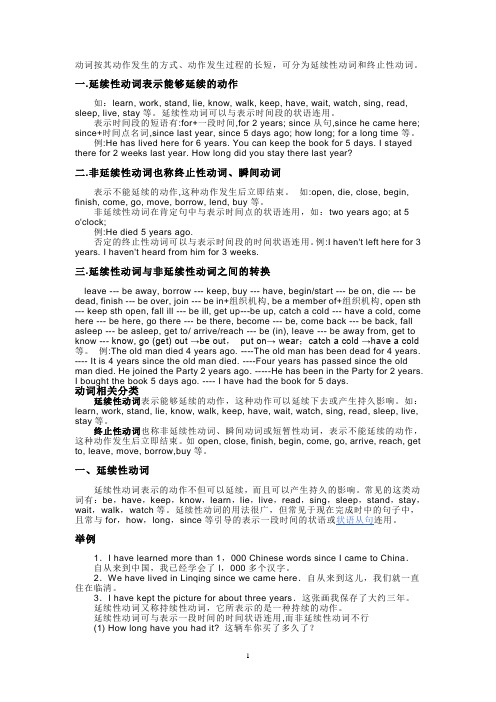
动词按其动作发生的方式、动作发生过程的长短,可分为延续性动词和终止性动词。
一.延续性动词表示能够延续的动作如:learn, work, stand, lie, know, walk, keep, have, wait, watch, sing, read, sleep, live, stay等。
延续性动词可以与表示时间段的状语连用。
表示时间段的短语有:for+一段时间,for 2 years; since从句,since he came here; since+时间点名词,since last year, since 5 days ago; how long; for a long time等。
例:He has lived here for 6 years. You can keep the book for 5 days. I stayed there for 2 weeks last year. How long did you stay there last year?二.非延续性动词也称终止性动词、瞬间动词表示不能延续的动作,这种动作发生后立即结束。
如:open, die, close, begin, finish, come, go, move, borrow, lend, buy等。
非延续性动词在肯定句中与表示时间点的状语连用,如:two years ago; at 5o'clock;例:He died 5 years ago.否定的终止性动词可以与表示时间段的时间状语连用。
例:I haven't left here for 3 years. I haven't heard from him for 3 weeks.三.延续性动词与非延续性动词之间的转换leave --- be away, borrow --- keep, buy --- have, begin/start --- be on, die --- be dead, finish --- be over, join --- be in+组织机构, be a member of+组织机构, open sth --- keep sth open, fall ill --- be ill, get up---be up, catch a cold --- have a cold, come here --- be here, go there --- be there, become --- be, come back --- be back, fall asleep --- be asleep, get to/ arrive/reach --- be (in), leave --- be away from, get to know --- know, go (get) out →be out,put on→ wear;catch a cold →have a cold 等。
延续和非延续动词
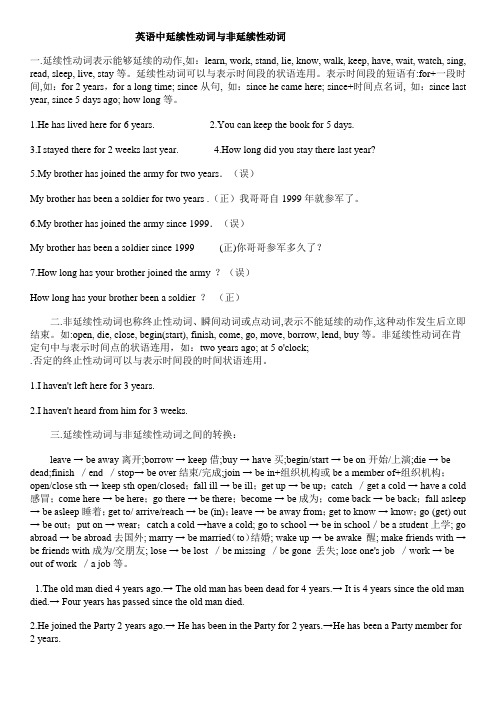
英语中延续性动词与非延续性动词一.延续性动词表示能够延续的动作,如:learn, work, stand, lie, know, walk, keep, have, wait, watch, sing, read, sleep, live, stay等。
延续性动词可以与表示时间段的状语连用。
表示时间段的短语有:for+一段时间,如:for 2 years,for a long time; since从句,如:since he came here; since+时间点名词,如:since last year, since 5 days ago; how long等。
1.He has lived here for 6 years.2.You can keep the book for 5 days.3.I stayed there for 2 weeks last year.4.How long did you stay there last year?5.My brother has joined the army for two years.(误)My brother has been a soldier for two years .(正)我哥哥自1999年就参军了。
6.My brother has joined the army since 1999.(误)My brother has been a soldier since 1999 (正)你哥哥参军多久了?7.How long has your brother joined the army?(误)How long has your brother been a soldier?(正)二.非延续性动词也称终止性动词、瞬间动词或点动词,表示不能延续的动作,这种动作发生后立即结束。
如:open, die, close, begin(start), finish, come, go, move, borrow, lend, buy等。
非常好用的“延续与短暂动词”讲解与练习

open-----be open 非延续性动词的用法转化 die------be dead close----be closed become---be borrow---keep begin/start-----be on put on----wear leave-----be away (from) buy-----have sleep /fall asleep----be asleep end/finish-----be over catch a cold-----have a cold come back—be back get up---be up come/go/arrive/get/reach/move------be in/at join the army----be in the army/ be a soldier join the Party----be in the Party /be a Party member →My brother has been in the army for two years. →My brother has been a soldier for two years.
She arrived yesterday evening. 她是昨天晚上到的。 (arrive为非延续性动词) He left here three days ago. 他三天前就离开了。(leave 为非延续性动词) They came to a wide river. 他们来到一条宽阔的河边。 (come为非延续性动词) Mother bought us some new clothes. 妈妈给我们买了一 些新衣服。(buy为非延续性动词) I found a wallet on the sidewalk. 我在人行道上发现一个 皮夹子。(find为非延续性动词)
延续性和非延续性动词

doesn’t she 1. Your sister often comes home late, _________ ? don’t you 2. You have lunch at school, __________? will he 3. Tom won’t be home today, __________? does he 4. He never speaks to you, ___________? will you 5. Please sit down, ______________? 6. Let’s go together, __________? shall we will you 7. Don’t smoke in the reading-room, __________? isn’t it 8. What a fine day, __________? 9. Peter went to the library this morning, didn’t he ________? don’t they 10. The Turners live in that street, _________ ? will there 11. There won’t e any classes tomorrow, ________ ?
延续性和非延续性动词
延续性动词: 延续性动词: work, learn, lie, wait, watch, read, read,sleep, live … 非延续性动词: 非延续性动词: open, close, finish, begin, arrive, leave, borrow, buy, fall, die … 延续性和非延续性动词和现在完成时: 延续性和非延续性动词和现在完成时: 延续性和非延续性动词都可用于现在完成时: 延续性和非延续性动词都可用于现在完成时: 1. The train has arrived. arrived. 2. Have you bought the book ? 3. I have read this book. 4. Jack has learned some Chinese.
- 1、下载文档前请自行甄别文档内容的完整性,平台不提供额外的编辑、内容补充、找答案等附加服务。
- 2、"仅部分预览"的文档,不可在线预览部分如存在完整性等问题,可反馈申请退款(可完整预览的文档不适用该条件!)。
- 3、如文档侵犯您的权益,请联系客服反馈,我们会尽快为您处理(人工客服工作时间:9:00-18:30)。
延续性动词与非延续性动词动词按其动作发生的方式、发生过程的长短可分为延续性动词与非延续性动词。
一.延续性动词表示能够延续的动作,如:study, learn, work, stand, lie, know, walk, keep, have, wait, watch, sing, read, sleep, live, stay等。
延续性动词可以与表示时间段的短语有:1.for+一段时间, eg: for 2 years; for a long time等2.since从句,since he came here;3.since+时间点名词+ago, eg:since last year, since 5 days ago;4. how long;二.非延续性动词也称终止性动词、瞬间动词或点动词,表示不能延续的动作,这种动作发生后立即结束。
如:open, die, close, begin, finish, come, go, move, borrow, lend, buy, move, happen, marry, arrive/reach, post, fall, break, lose, give,常见的这类动词有:go, come, leave, arrive, lose, land, catch, join, kill, find 等。
例如:1. He has joined the club for a long time. ( 错)2. He has been a member of the club for a long time. ( 对)3. His grandfather has died for over 30 years. ( 错)4. His grandfather has been dead for over 30 years. ( 对)【注意】之所以将这些动词称为瞬间动词,是因为这些动词在眨眼之间发生并终结。
故不能与表达“段”的长时间状语连用,不论是在进行时还是现在完成时中。
下面的例句是正确的:1. He is dying.2. He has died.一个生物体是死是活,界与其终结生命的前与后的一霎那,如果上述例句加上了表达段的时间状语,试请问:该人是死是活?但是,有几个表示去向的非延续性动词如go, come, start, leave 等,可以同表示时间段的状语for 短语连用。
但要注意,这种用法的for 短语表示的不是句中谓语动词延续的时间,而是该动词动作完成后再做某事所需要的时间。
例如:1. She has gone to Nanjing for three days. (= She’s come here, intending to stay for three days.)2. Alice has left for Paris for three months. (= Alice has left for Paris, intending to stay there for three months.)3. We are starting for Shanghai for two weeks. (= We are going to Shanghai, and we are planning to stay there for two weeks.)【注意】学生如果遇到与第一点所不符的情况,如本点所讲述,不要轻易下结论为“错题”,应该认真分析后再做结论。
比如我们学过了这样的结构:make somebody do something;而我们常可见到这样的句子:He made a candle to give light.在这个句子中的宾语后面明显带了to ,与短语所表达的不符,但我们不要忘了:make 的基本意思为“制造”,并且,不定式结构在短语中充当宾语补足语,而在例句中充当状语。
非延续性谓语动词后有非谓语动词时,可与表示一段时间的状语连用,这时,时间状语所修饰的不是句中的谓语动词,而是非谓语动词。
例如:1. She went to work for two weeks. (for two weeks 修饰to work)如果要与for+ 时间段,since+年份,since+时间段+ago,how long连用时,瞬间性动词要变延续性动词。
三.延续性动词与非延续性动词之间的转换:例:(1)他死了三年了。
误:He has died for three years.正:He has been dead for three years. 正:He died three years ago.正:It is three years since he died.正:Three years has passed since he died.(2) 他来这儿五天了。
误:He has come here for five days.正:He has been here for five days.正:He came here five days ago.正:It is five days since he came here.正:Five days has passed since he came here.(1)、(2)句中的die、come为终止性动词,不能与表示"段时间"的状语连用。
那么,应如何正确表达呢?可以采用下面的四种方法:(1)将句中终止性动词转换为相应的延续性动词, 如上面两例中的第一种正确表达方式.(2)将句中表示"段时间"的状语改为表示过去确定时间的状语,如下面两例中的第二种正确表达方式。
(3)用句型"It is+段时间+since..."表达原意,如上面两例中的第三种正确表达方式。
(4)用句型"时间+has passed+since..."表达原意,如上面两例中的第四种正确表达方式。
四、终止性动词可用于现在完成时否定式中,成为可以延续的状态,因而可与表示一段时间的状语连用。
如:1.He hasn't left here since 1986.2.I haven't heard from my father for two weeks.五、终止性动词的否定式与until/till连用,构成"not+终止性动词+until/till ..."的句型,意为"直到……才……"。
如:1. You can't leave here until I arrive.直到我到了,你才能离开这里。
2. I will not go to bed until I finish drawing the picture tonight.今天晚上直到我画完画,我才上床睡觉。
六、终止性动词可以用于when引导的时间状语从句中,但不可以用于while引导的时间状语从句中。
when表示的时间是"点时间"(从句谓语动词用终止性动词),也可以是"段时间"(从句谓语动词用延续性动词)。
而while表示的是一个较长的时间或过程,从句谓语动词用延续性动词。
如:1. When we reached London, it was twelve o'clock. (reach为终止性动词) 2. Please look after my daughter while/when we are away. (be away为延续性动词短语)七、终止性动词完成时不可与how long连用(只限于肯定式)。
如:误:How long have you come here?正:How long have you been here?正:When did you come here?误区[ 一]瞬间动词的完成时误区之一是:现在完成时表达的是“从前发生的动作”,“延续到现在”。
而瞬间动词一瞬间便完成了从发生到结束的全过程,能有完成时吗?现在完成时虽然动作“发生在过去”但其“影响”持续到现在。
因整个存在的时间短,所以其完成时不与表达“段”的时间连用。
[ 二]瞬间动词的进行时误区二:leave, come 等终结性动词,没有进行时的形式。
例如come 这一个词,(尤其在肯定句中,可参见第四点)不与表达段的时间状语连用。
比如我们不说:He has come for days. 而要说:He came days ago. 或:It’s days since he came. 常说的He is coming. /He is leaving./ He is dying 等,并不是表示动作“正在进行”,而是表示“动作即将发生”。
补充练习:1.When he arrived at the bus stop, the bus ___ for 20 minutes.A. has leftB. had leftC. has been awayD. had been away2. I _____ the League for 5 years so far.A. joinedB. have joinedC. have been in3.The factory _____since the February of 1988.A . has been open B. has openedC. was openD. opened4. Mary and Rose _______friends since they met in 2000.A. have madeB. have beenC. madeD. have become5.You mustn't ____until he comes back.A. be awayB. leaveC. be left6.The meeting _______ for a week now.A. has finishedB. has endedC. has been over7.Miss Gao ______ this school for nearly 5 years.A. has been inB. has come toC. has taught8.Ben ______ a teacher for 4 years .A. has beenB. has becomeC. wasD. became9. I ______ home for a week.A. have returnedB. have been backC. returned10. How long _______ he ________ ?A. diedB. has, diedC. has, been dead11.He_____at eight yesterday afternoon.A. sleptB. was sleepingC. has sleepD. had slept12.He ________ the car for a week.A. boughtB. has boughtC. has had13.-----How long _____ you _____ ill ? -----Two weeks.A. did fallB. have, fellC. have, been14.Since 2000, he _____ his hometown.A. has leftB. has moved awayC. has been away from15.I'll lend you the book , but you can only ____ it for 2 days.A. borrowB. keepC. take16.The bus ______ on the road for 2 hours so far.A. has stoppedB. stoppedC. has been17.Are you _____ the jacket these days?A. wearingB. putting onC. dressingD. on18. He ________ foe 2 hours.A. got upB. has got upC. has been up19. Tom is ill in hospital. He _______ a cold for several days.A. isB. catchesC. has caughtD. has had20. ----- How long can I ______ the book? ------ Two weeks.A. borrowB. lendC. getD. keep练习答案1---5 D C A B B;6---10 C A A B C; 11---15 B C C C B; 16---20 C A C D D。
